Laptop Mag Verdict
The Epomaker x Feker Galaxy80 is a great mechanical keyboard with a premium aluminum chassis and a light, pillowy typing experience. Its fast linear switches make it well-suited to typing and gaming.
Pros
- +
Full-aluminum case
- +
Cushy gasket-mounted typing
- +
Quiet, light linear switches
- +
Hidden USB dongle storage
- +
Wired or wireless
Cons
- -
No volume knob
- -
Awkward F13 key
- -
No height adjustment
- -
No number pad
Why you can trust Laptop Mag
Rarely does something made of aluminum elicit a feeling that could be described as "pillowy." Yet, that's the standard for mechanical keyboards.
Enter the Epomaker x Feker Galaxy80. It's a premium mechanical keyboard for a mid-range price that offers a glorious typing experience.
Other Epomaker keyboards, including the budget banger Epomaker x Leobog Hi75, have fared well in previous reviews, and the Galaxy80 has more than kept up with its predecessors.
I was immediately impressed by its sturdiness, minimalism, and keen sense of balance while typing. I tested the black-and-gray version, with critical keys like Esc and Enter bursting off the board in a sci-fi cyan color. It's a sleekly designed peripheral that feels oh-so-functional.
If you’re looking for a do-it-all mechanical keyboard you can take to the office or bring home for some gaming, the Galaxy80 is it.
It might even end up being among our best keyboards of the year or the best gaming keyboards.
The Epomaker x Feker Galaxy80 balances price and performance for a well-rounded mechanical keyboard.
Sign up to receive The Snapshot, a free special dispatch from Laptop Mag, in your inbox.
Here’s an in-depth look at how it performed in our testing.
Epomaker x Feker Galaxy80: Price and configurations
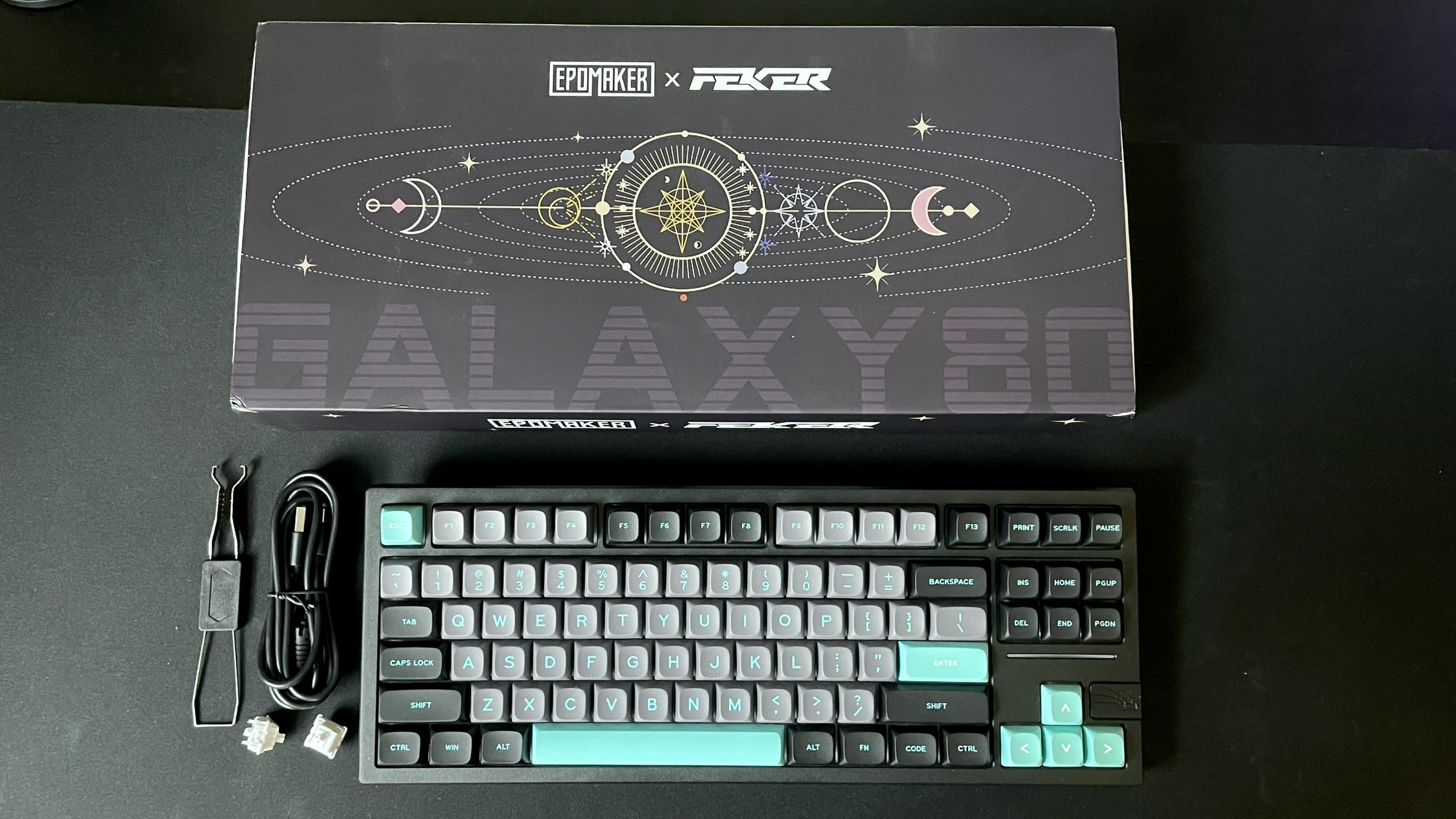
The Epomaker x Feker Galaxy80 is available either pre-built or as a barebones kit. The pre-built version comes complete and ready to use, while the barebones kit includes everything except the switches and keycaps. Either version is available in five colors: white, black, blue, purple, and pink.
The prebuilt model costs $105.99 but can also be purchased for just $99.99 on Amazon. It includes Feker Marble White linear switches topped with MDA profile keycaps made of Doubleshot PBT. You also get a rubber, detachable USB Type-C cable, a switch and keycap puller, and spare switches in the box.
The Galaxy80 measures 16.42 x 7.48 x 2.6 inches and weighs a hefty 5.32 pounds, mainly due to the full aluminum alloy case, so durability shouldn’t be a concern.
Epomaker x Feker Galaxy80: Design
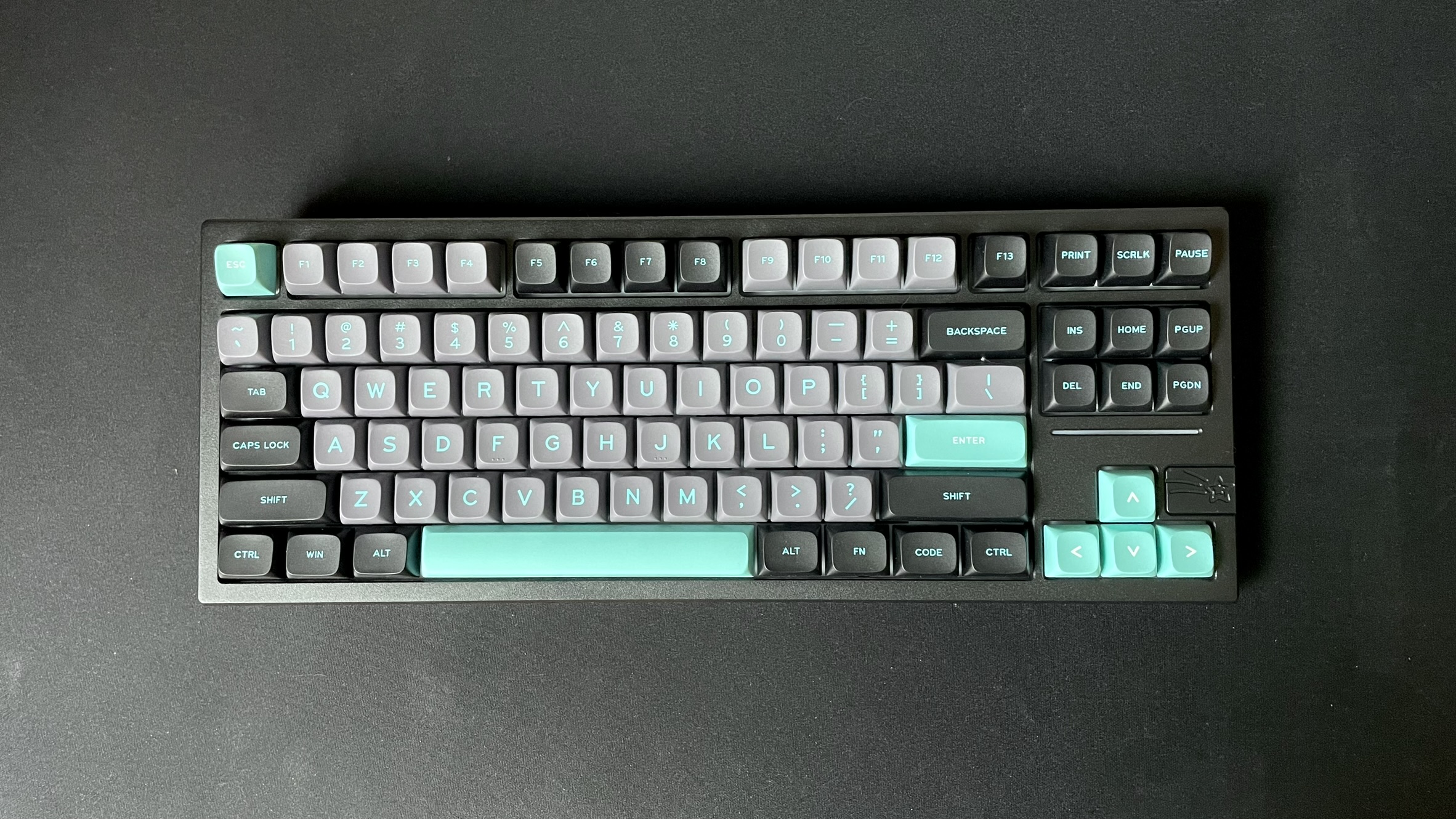
The Epomaker x Feker Galaxy80 is a “tenkeyless” or TKL keyboard with everything except the number pad. It has a complete row of function keys at the top, nine media and action keys on the right-hand side, and a complete set of standard-size primary keys. Most users only need those keys, but if a number pad is a must-have, you might be better suited to something like the Lofree Block.
One thing that immediately stood out to me when I picked up the Galaxy80 was the build quality. This keyboard features an aluminum alloy case with a matte powder-coated finish, so it feels and looks great. It’s heavy, but that means it won’t move around on your desk, especially with the help of the rubber grip feet underneath.
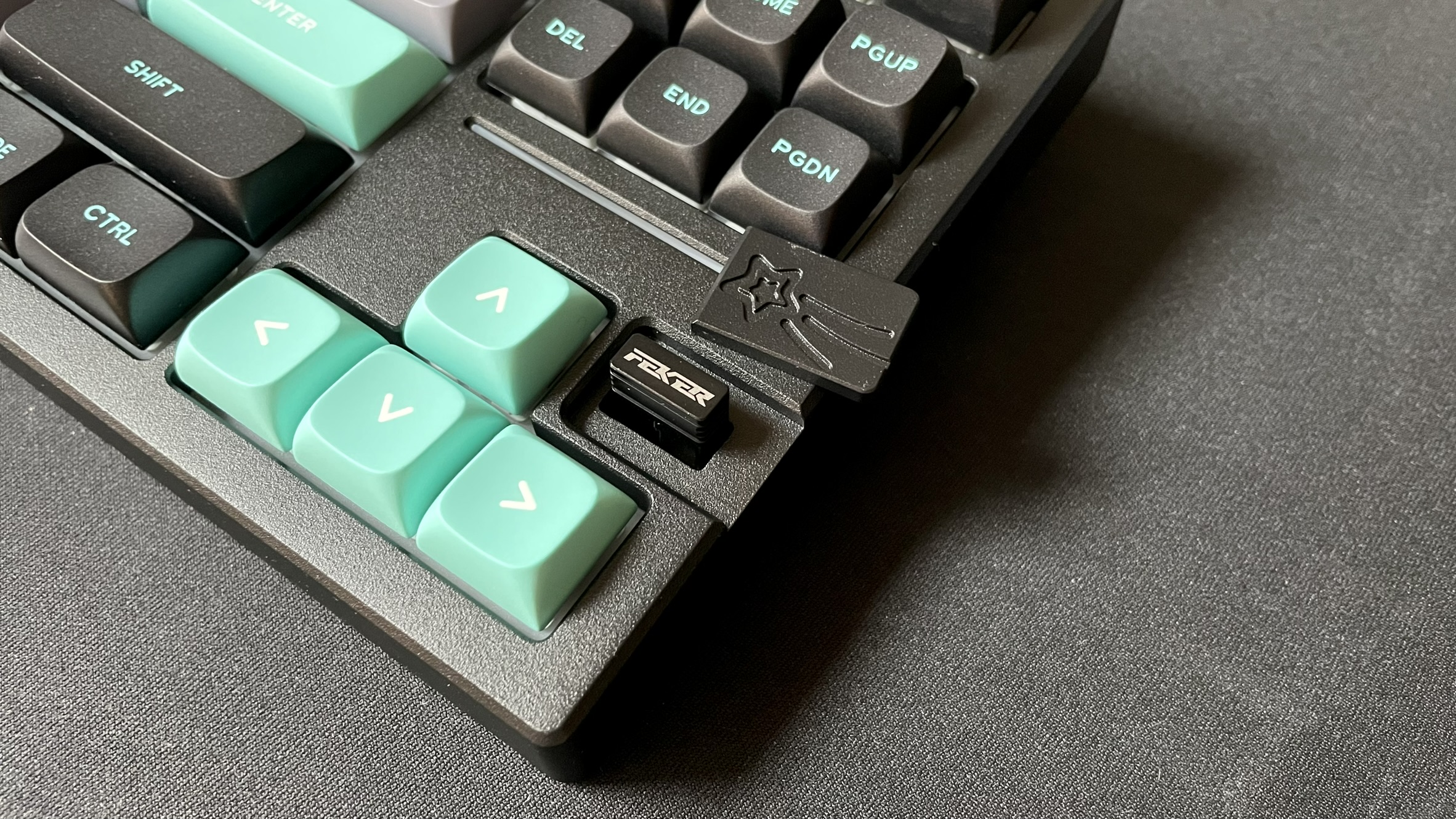
It’s premium on the inside, too. The Galaxy80 has five layers of padding and a gasket structure, so its typing experience is absolutely pillowy. If you press down on the main keys, you can see them flex on the gasket pads. If you aren’t familiar with gasket-mounted mechanical keyboards, they’re a joy to type on. The extra flex from the gasket pads cushions each keystroke and improves sound quality.
The Galaxy80 is fully backlit and includes 19 lighting effects you can swap through with the shortcut Fn+Enter. You can change the color of the solid lighting mode with the shortcut Fn+\| and adjust the lighting brightness by holding the function key and pressing the up or down arrow keys. There’s also a little LED strip above the arrow keys that always has a little rainbow wave, which is a delightful detail.
One unique feature of the Galaxy80 I loved was the hidden USB dongle storage. There’s a little star detail in the bottom right corner of the case. It’s a magnetic door that covers the garage for the 2.4GHz USB receiver. This clever and convenient design is handy for anyone who takes their keyboard between home and the office or school.
Epomaker x Feker Galaxy80: Keys
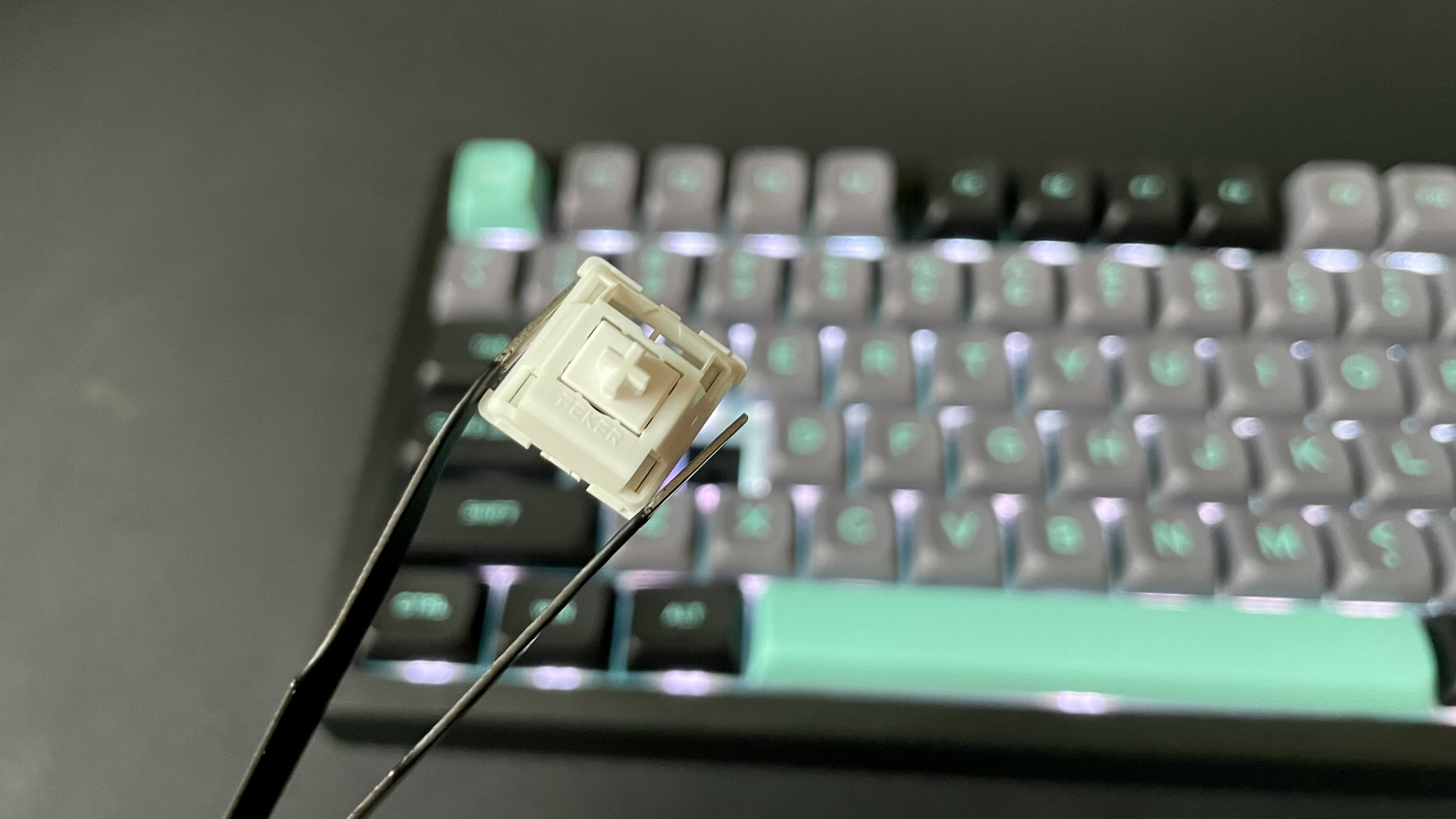
If you want to try out a mechanical keyboard but don’t want loud switches disturbing you or anyone working around you, the Epomaker x Feker Galaxy80 could be a perfect fit. It has a light, cushy typing experience thanks to five layers of padding and a gasket structure inside the case. Plus, the Faker Marble White linear switches are satisfying yet quiet.
The Galaxy80 has a poppy sound to it. It reminded me of a toned-down version of the Epomaker x Leobog Hi75 switches, which had some of the best-sounding keys I’ve ever tested. The linear switches on the Galaxy80 have a low actuation force of just 45 grams, so you can type all day on this keyboard without your fingers getting tired or cramped. The stabilizers in the larger keys are also nice and quiet, including the space bar.
The matching keycaps that come with the Galaxy80 are made of doubleshot PBT, so they have a nice matte texture on top. The MDA profile mixes XDA and Cherry shapes with prominent, centered legends.
Of course, if MDA keycaps aren’t your style, you can swap them out for any other standard set. If you’re unsure which keycap style is right for you, visit our guide to the types of keycap profiles and materials.
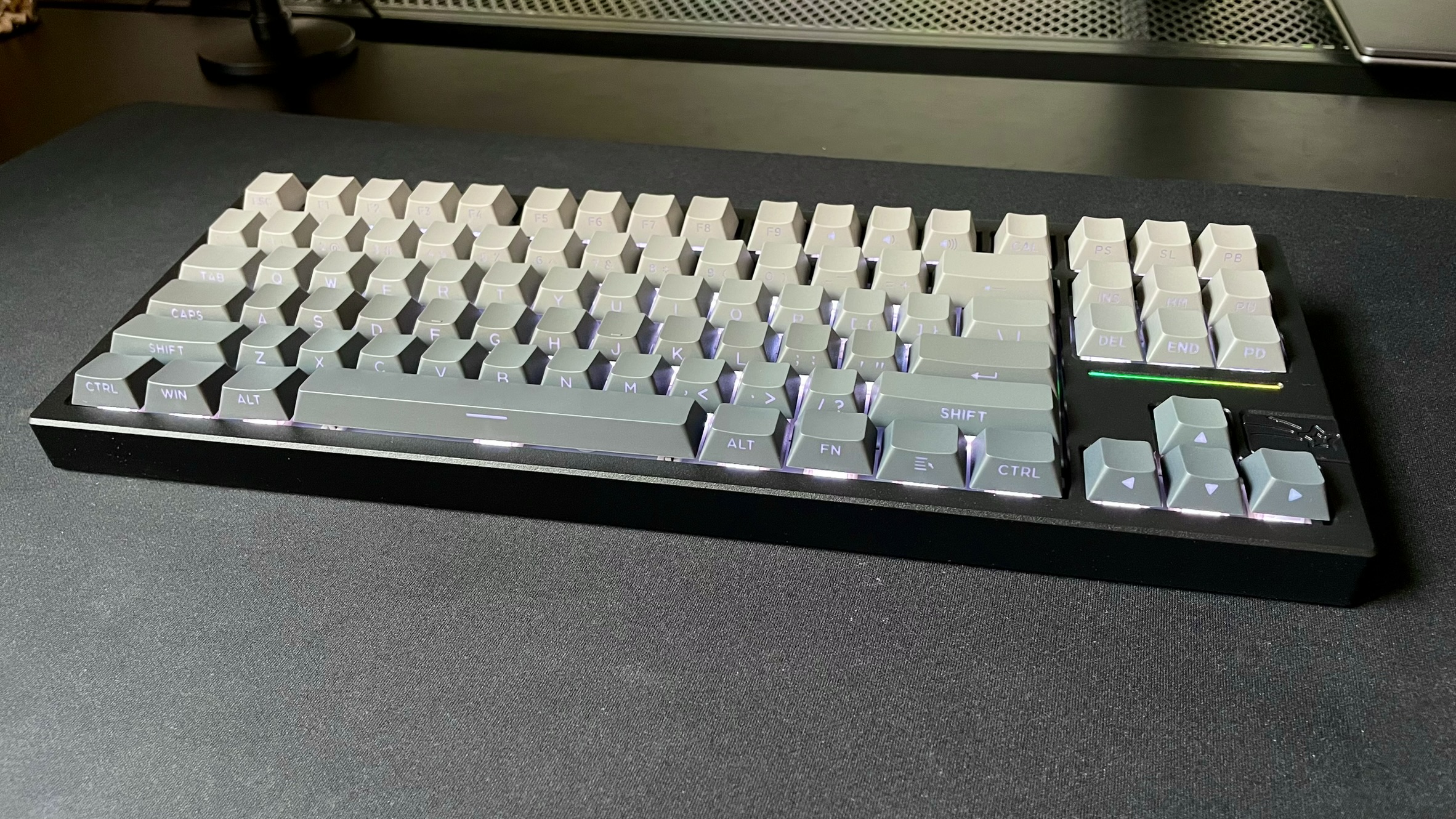
I’ve wanted a more minimalistic look for my desk setup, so I swapped out the keycaps on my Galaxy80 for smoky gray gradient keycaps from Epomaker. These are also doubleshot PBT and feature side legends that line up perfectly with the Galaxy80's south-facing RGB. Plus, they’re only $25, a great deal for a complete set of PBT keycaps.
The Galaxy80 is also fully hot-swappable so you can change or replace the switches. A couple of spares are included in the box, but the Galaxy80 is compatible with any standard Cherry-style switches.
Epomaker x Feker Galaxy80: Performance
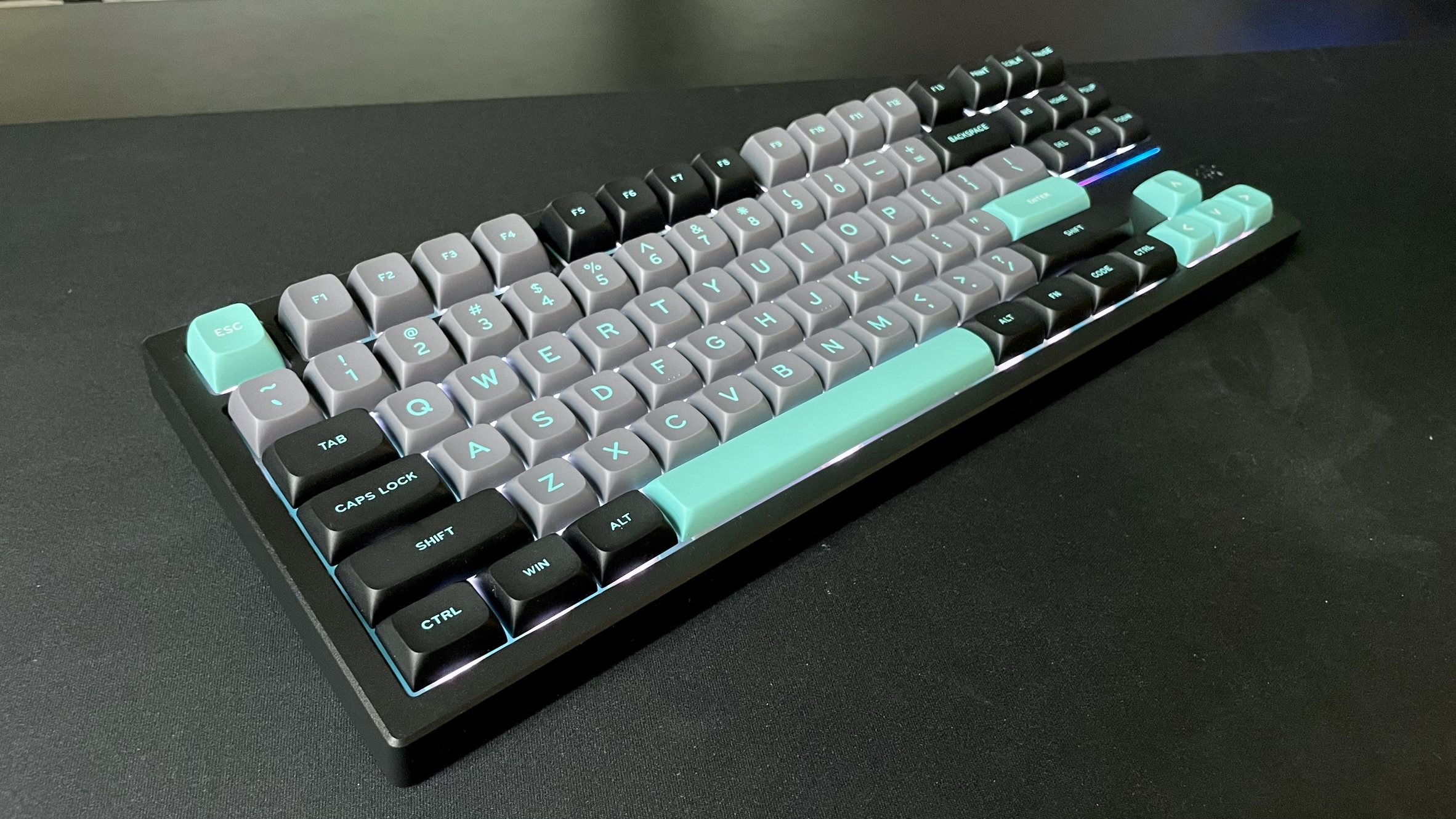
The light linear switches on the Epomaker x Feker Galaxy80 are great for typing and gaming, making this a good option for anyone needing an all-purpose keyboard. The Feker Marble White switches are fast enough to keep up with fast-paced gameplay and speed typing. On the Monkeytype typing test, I scored 95 wpm with an accuracy of 97% while typing on the Galaxy80, above my usual desktop average of 84 wpm and 93% accuracy.
I tested the Galaxy80 in a few of my favorite games, including a couple of rounds of Roboquest and several hours of Minecraft. The Galaxy80’s linear switches kept pace with swift, rapid-trigger gameplay in Roboquest. In Minecraft, the Galaxy80 never had issues with my double-tapping to sprint, and keystrokes were always fast and precise.
While the Feker Marble White switches aren’t as fast as specialty gaming switches like Hall Effect or magnetic switches, they can still deliver good performance. The Galaxy80 is a well-balanced keyboard that can do almost anything, so if you’re looking for a superb typing experience but want to do some casual gaming on the side, it would be a great fit.
Epomaker x Feker Galaxy80: Connectivity
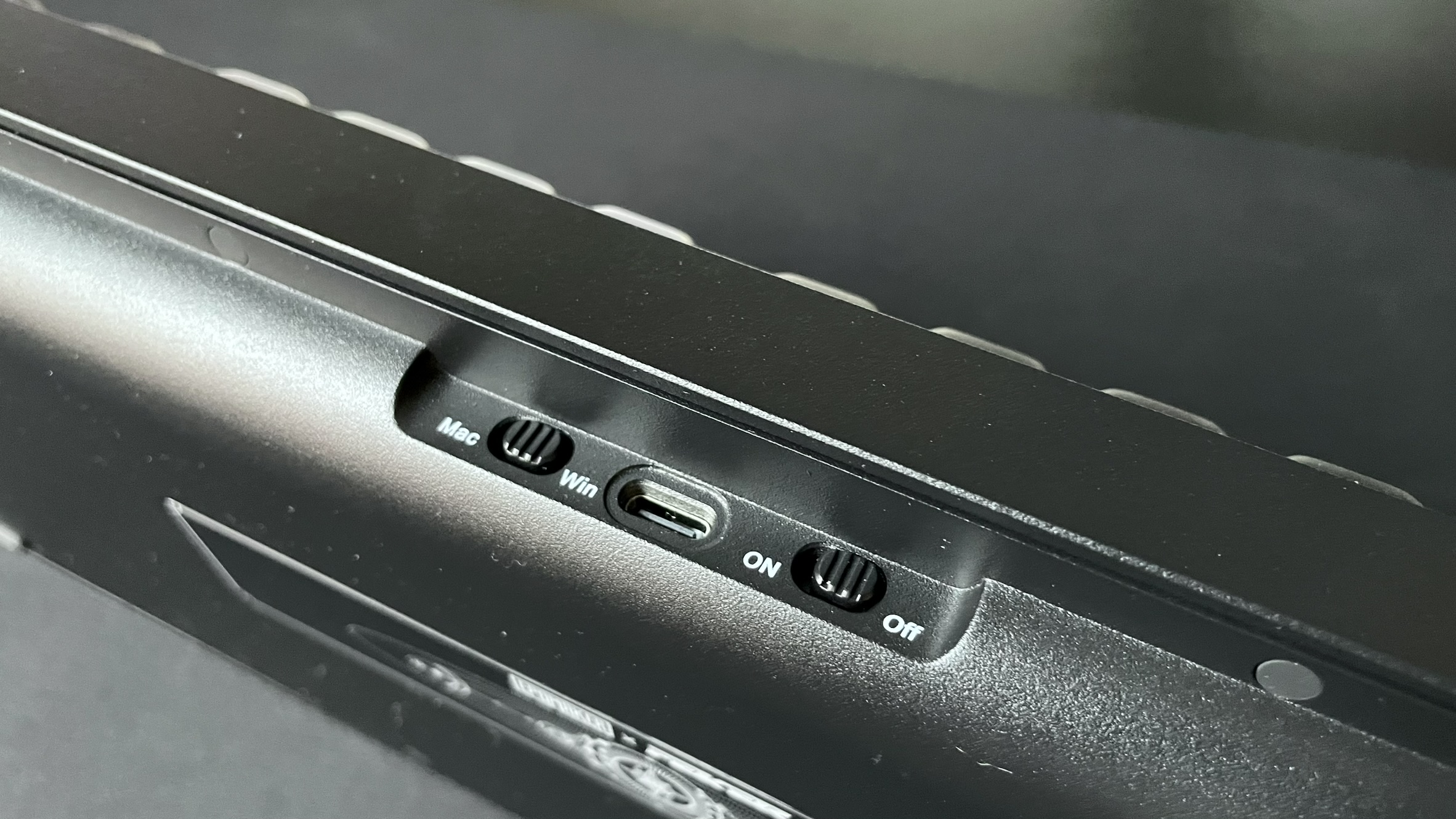
The Epomaker x Feker Galaxy80 has several connectivity options, including wired via a detachable USB Type-C cable, wireless with Bluetooth, or the included 2.4GHz USB dongle. If you have trouble finding the dongle, check in the hidden garage behind the little shooting star emblem in the bottom right corner of the case.
All three connectivity methods worked seamlessly for me. If you want to swap out the rubber cable, the USB-C port on the back of the case is also open enough to work with most third-party cables. My favorite coiled keyboard cable fit with no issues.
I found the Galaxy80's battery life in wireless mode fairly impressive. I charged it once at the beginning of the week while I was testing it, and the battery was still going strong at the end of the week. There’s no battery indicator like a mini display, but the LED under the bottom right function key will turn red when the battery gets low.
Bottom Line
The Epomaker x Feker Galaxy80 has much going for it, from its premium build quality to its smooth, light switches. It’s fantastic for typing, especially if you want a keyboard that sounds good but isn’t too loud. Three different connectivity options also give it plenty of flexibility for any desk setup. It can even keep up in some casual gaming or speed typing sessions.
The Galaxy80 is an excellent all-around keyboard well-suited to people who want one keyboard for a range of uses. However, at $105, the Epomaker x Leobog Hi75 may be a better value for some users thanks to its lower price and the inclusion of a volume knob. Likewise, if you are specifically looking for a gaming keyboard, you might be better served by the Endgame Gear KB65HE, which is less than $50 more and includes ultra-fast Hall Effect switches. You can also visit our guide to the best gaming keyboards for more alternatives.

Stevie Bonifield is a freelance tech journalist who has written for PC Gamer, Tom's Guide, and Laptop Mag on everything from gaming to smartwatches. Outside of writing, Stevie loves indie games, TTRPGs, and building way too many custom keyboards.

